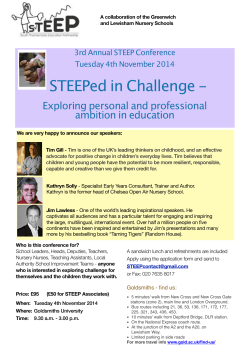
The Conflict Shoreline: Colonialism as Climate Change
The Conflict Shoreline: Colonialism as Climate Change Colonial cartographers and administrators have continuously attempted to define Friday, “environmental thresholds” within empire. This lecture will speak about attempts at March 20, 2015 scientifically defining, measuring and mapping 3:00 pm - 4:30 pm the “aridity line” as the threshold of the desert from the Ottoman period through the period of European colonisation to the present. The engagement and measurement of the desert threshold is important because imperial Michael Ames Theatre, later national governments saw climate Museum of Anthropology, and change as the very goal of colonisation, as 6393 NW Marine Drive they tried to expand the limits of arable lands, make the climate more familiar to European UBC, Vancouver sensibilities and bring the nomads under state control. … My aim will be to show that climate change is not only the collateral, Admission to the Museum of unintentional side effect of the good intention of modernisation and industrialisation but is Anthropology is free to UBC faculty, staff and students with the very aim of colonial modernity. The lecture will trace this debate through a trial of the valid IDs. small village of Al Arakib in the Beduin Naqb in Israel, following the counter forensic methods of “forensic architecture.” the university of british columbia FACULTY OF ARTS Eyal Weizman Goldsmiths College, University of London Professor Eyal Weizman is Professor of Visual Cultures and Director of the Centre for Research Architecture, Goldsmiths College, University of London. He is the author (among other books) of Hollow Land: The Architecture of Israeli Occupation (2007), The Least of All Possible Evils: Humanitarian Violence from Arendt to Gaza (2012), and co-editor of Forensis: An Architecture of Public Truth (2014).
© Copyright 2025





















